Create VLC Slideshows with this Step-by-Step Guide
VLC Media Player is one of the most versatile, powerful, and capable tools ever built. This free and open-source tool is the go-to media player for millions of users worldwide. However, media playback is not everything it does. VLC is also a capable media editor, streaming tool, and converter, among other things. Among its many hidden features, the image slideshow is a cool one. That's right, VLC slideshow is a real feature, and you can create one in just a matter of seconds. It's easy and fun - even easier than standard presentation tools like MS PowerPoint, although VLC lacks the depth and breadth offered by PPT. In this guide, you'll learn how to create VLC slideshows with ease, thanks to our step-by-step tutorials.
Part 1: Can You Create a VLC Slideshow of Photos and Pictures?
Yes, VLC supports a variety of media file formats, including images such as JPG, PNG, BMP, GIF, and WEBP, among others. Clearly, the tool supports all the mainstream image formats you're likely to use. However, some of the more advanced image formats, such as HEIC, SVG, and PSD, are not supported by the tool, as it's not designed to be a full-fledged image editor. Nevertheless, it can create slideshows of images in common formats, which can come in handy when you're not well-versed in or don't wish to use dedicated slideshow tools.
Interestingly, VLC offers three ways for creating slideshows. We'll discuss each of them.
Part 2: How to Create VLC Slideshows
Method 1: VLC Slideshow Your Pictures Library
This is the easiest method to create a slideshow of your pictures in VLC Media Player. It's so easy that anyone can do it. However, this method only allows you to create slideshows using images and pictures from specific folders that VLC can detect. If they're located elsewhere, you won't be able to add them to the VLC slideshow. Here's a step-by-step tutorial for creating VLC slideshows the easiest way:
Step 1: Open Your Pictures Folders in VLC
Launch VLC Media Player. Go to the 'View' option in the Main Menu. Check the 'Docked Playlist' option to open up the Playlist Menu. You can also do it by using the shortcut 'CTRL + L'.
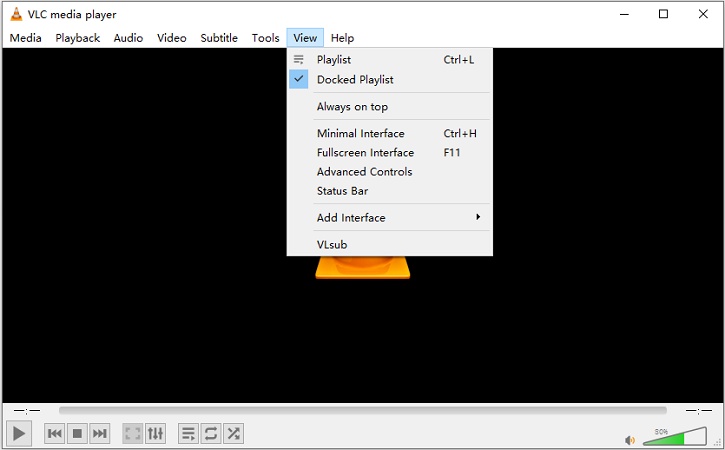
Step 2: Slideshow Entire Folder
Navigate to the 'My Pictures' folder in the left panel. Choose any of the displayed folders. Double-click on an image to start the slideshow.
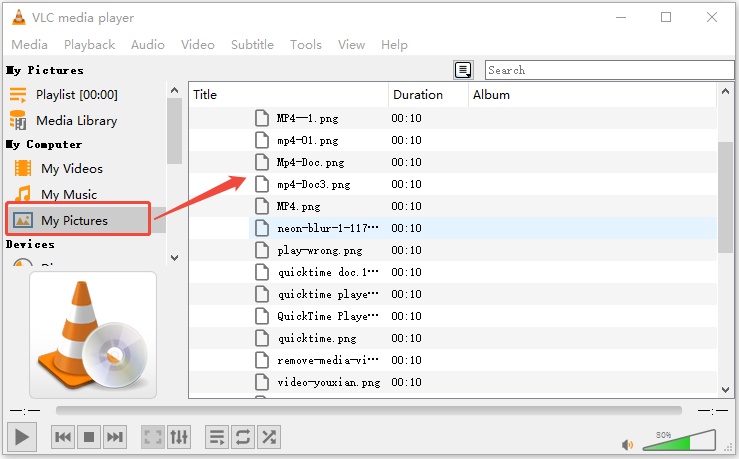
Each image in the select folder will be displayed onscreen for 10 seconds before VLC switches to the next image in the folder. You can toggle between 'Loop all,' 'Loop One,' and 'No Loop' options.
Method 2: VLC Slideshow Any Pictures You Like
This method is almost as easy as the previous one, but it gives you more control over the images added to your slideshow. That's right, it lets you create custom slideshows of any images you like, and it's quite similar to the previous method too. Here's a quick tutorial for you:
Step 1.Launch VLC Media Player. Go to 'View' in the Main Menu. Select the 'Docked Playlist' option to open up the Playlist Menu. Alternatively, you can use the shortcut 'CTRL + L'.
Step 2.Go to 'Playlist' on the left panel. Select and drag images from various folders on your desktop directly into the VLC playlist box. Double-click on the first image in the playlist to start the slideshow.

Method 3: Create Custom VLC Slideshows
For users who are not familiar with the drag-and-drop feature, this method provides a more logical approach to creating custom image slideshows in VLC. It's a bit convoluted, but some users prefer it. So, here's a quick tutorial on this method:
Step 1: Activate the Multiple Media Opening Feature
Launch VLC Media Player. Go to 'Media' in the Main Menu. Select 'Open Multiple Files'.
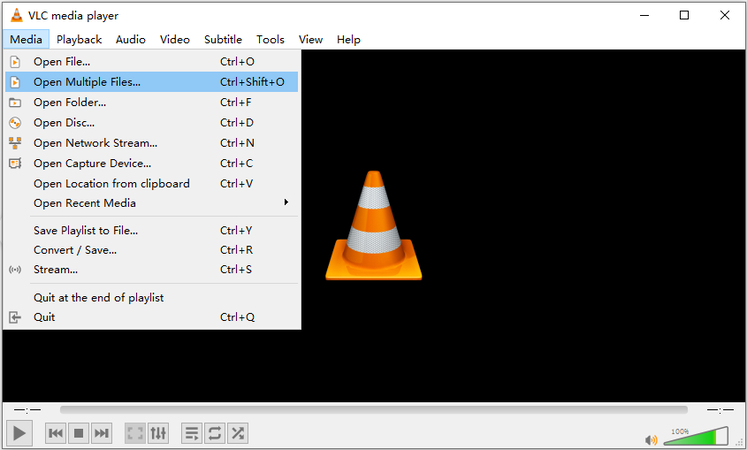
Step 2: Create Custom Image Playlist
In the newly opened 'Open Media' window, click the 'Add' button to launch the file selection explorer. Choose 'All Files' in the dropdown list of file formats at the bottom right. Navigate to a folder, select images of your choice, and hit 'Open' to add them to the File Selection list.
Repeat the process by navigating to different folders and adding images from each one.
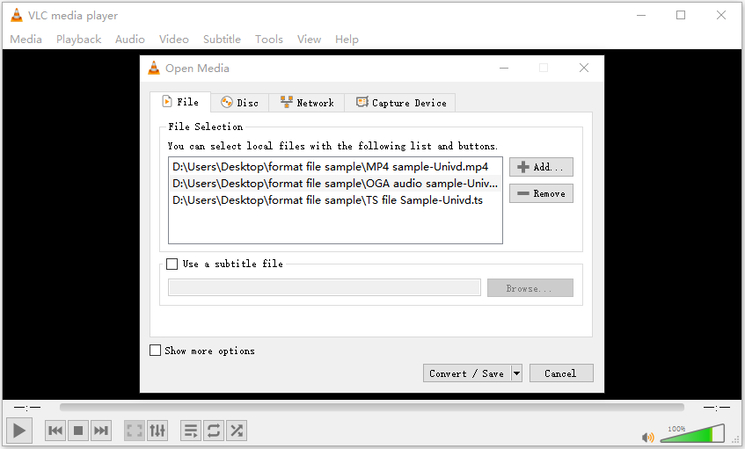
Step 3: Start the Slideshow
Hit the 'Play' button at the bottom right corner to start the slideshow.
Part 3: How to Create Reusable VLC Slideshows
The above methods create slideshows that remain alive as long as the VLC app is open. Once you close it, the slideshows are gone forever. If you'd like to create reusable slideshows that you can play at any time, you need to save the slideshow playlists you've created.
Step 1.Create an image playlist with any of the methods described above.
Step 2.Go to 'Media' in the Main Menu and choose 'Save Playlist to File.' This launches a file explorer window, which you can use to navigate and select the destination for the playlist file. Once you do, hit 'Save' to save the playlist.

Bonus: Convert Images to VLC-Compatible Formats with HitPaw Univd
VLC supports a limited number of image formats for a slideshow. If your image is saved in an unsupported format, you're in trouble. Fortunately, HitPaw Univd can convert images from one format to another format. You can use it to save your images in VLC-compatible formats.
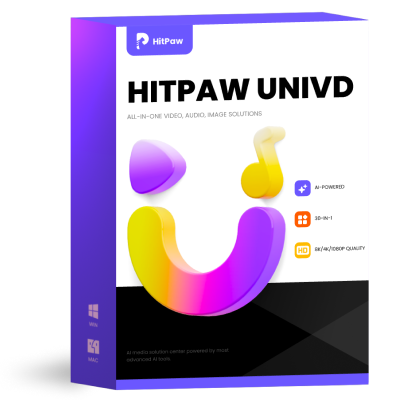
HitPaw Univd - All-in-One Video Solutions for Win & Mac
Secure Verified. 254,145 people have downloaded it.
- Univd uses GPU acceleration to convert images faster than any other tool.
- You can convert thousands of images from one format to another per batch.
- Univd supports a wide variety of image formats, making conversion a breeze.
- With Univd, you can convert images without losing their original quality.
- Univd's compression algorithms reduce file size by 80% with noticeably quality loss.
- Edit images during conversion to make them stand out in the slideshows.
Secure Verified. 254,145 people have downloaded it.
How to Convert Image Formats with HitPaw Univd
Step 1: Import Images to Univd
Start by launching the HitPaw Univd app on your desktop. Go to the 'Toolbox' tab, select 'Image Converter,' and click the 'Add Image' button to import your image files.
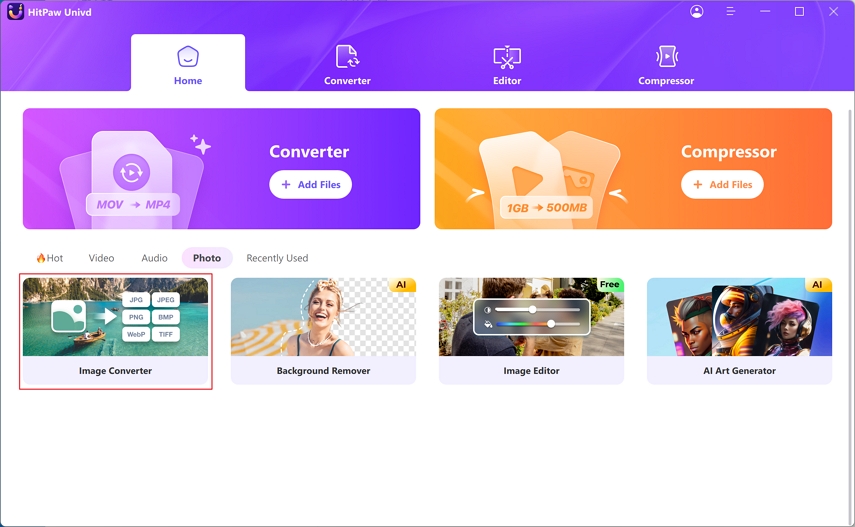
Step 2: Choose Output Format
Open the 'Convert all to' drop down, select a VLC-compatible format, such as 'JPG', as the output format, and use the 'Save to' box to choose the destination folder for the output files.
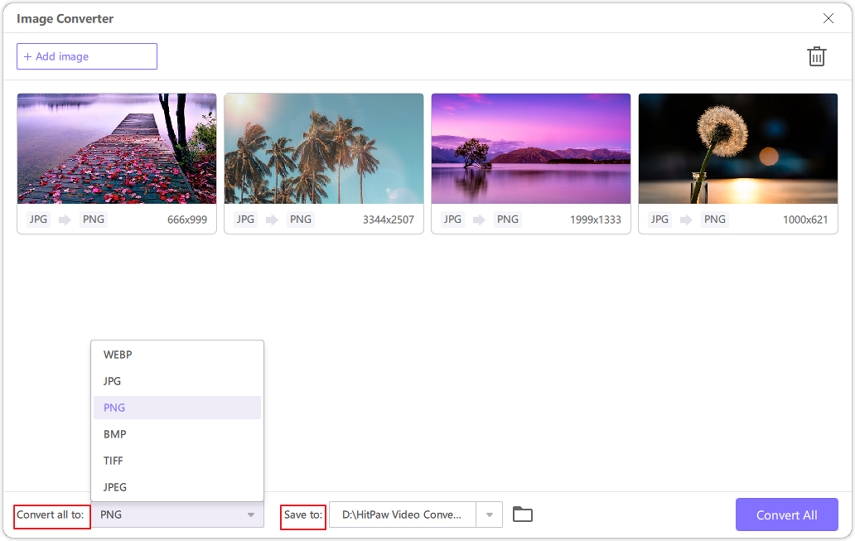
Step 3: Convert Image to VLC Format
Click the Convert All button to batch convert image to VLC-compatible format in high speed.
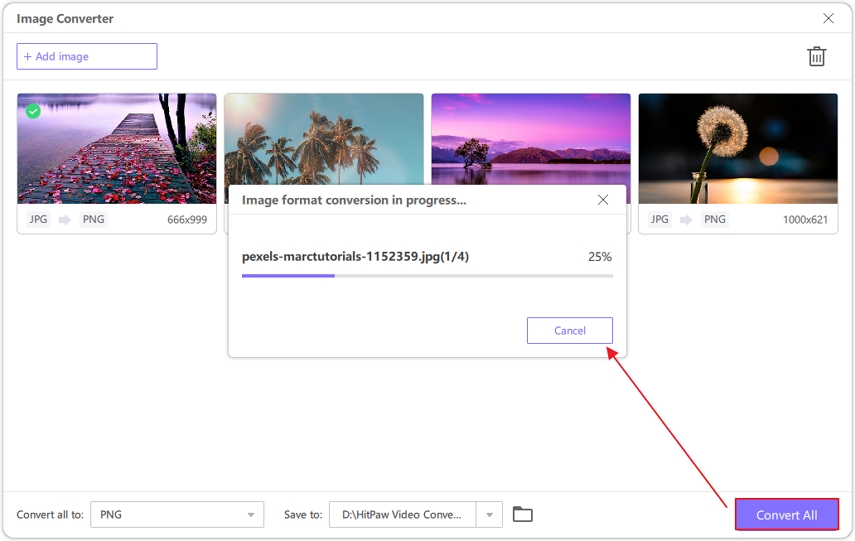
FAQs on VLC Slideshow
Q1. Can I loop slideshows in VLC?
A1. Yes. You can use the Look button in the Control Bar at the bottom. You can choose to loop the slideshow once, infinitely, or not at all.
Q2. Can I save the VLC slideshow as a video?
A2. No. VLC does not have the feature to save slideshows as videos.
Conclusion
VLC Media Player is a surprisingly capable tool for creating simple image slideshows. You don't need any special skills or extra apps for this purpose. Whether you want to display your photo albums, create a quick presentation, or just experiment with VLC's lesser-known features, the methods in this guide make your task easy. However, if your pictures don't work in VLC, you can use a tool like HitPaw Univd to change them to the right format. Univd is fast, easy, and perfect for anyone who wants to convert images without any familiarity with image editing tools.



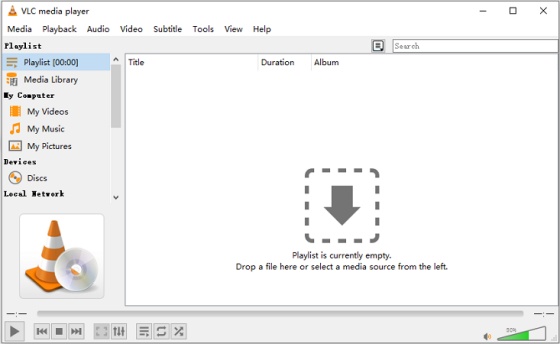
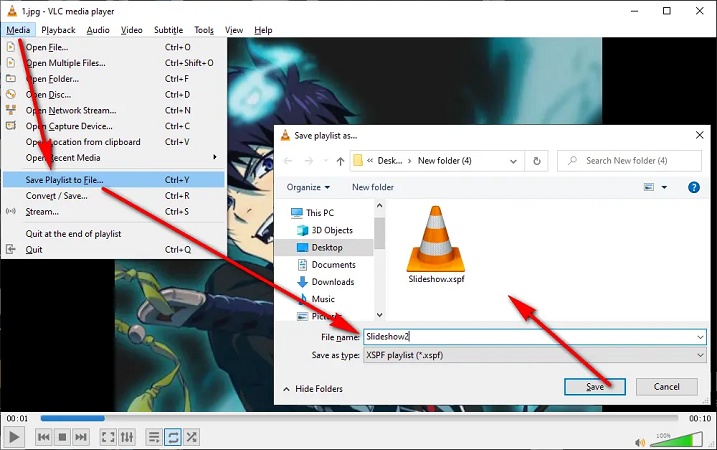





 HitPaw VoicePea
HitPaw VoicePea  HitPaw VikPea (Video Enhancer)
HitPaw VikPea (Video Enhancer)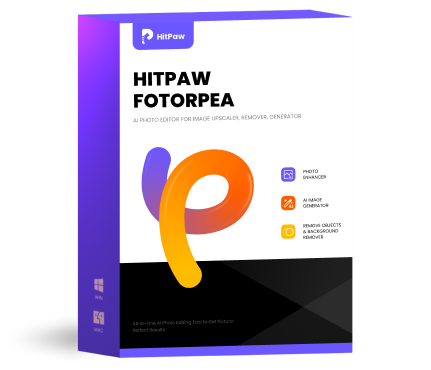 HitPaw FotorPea
HitPaw FotorPea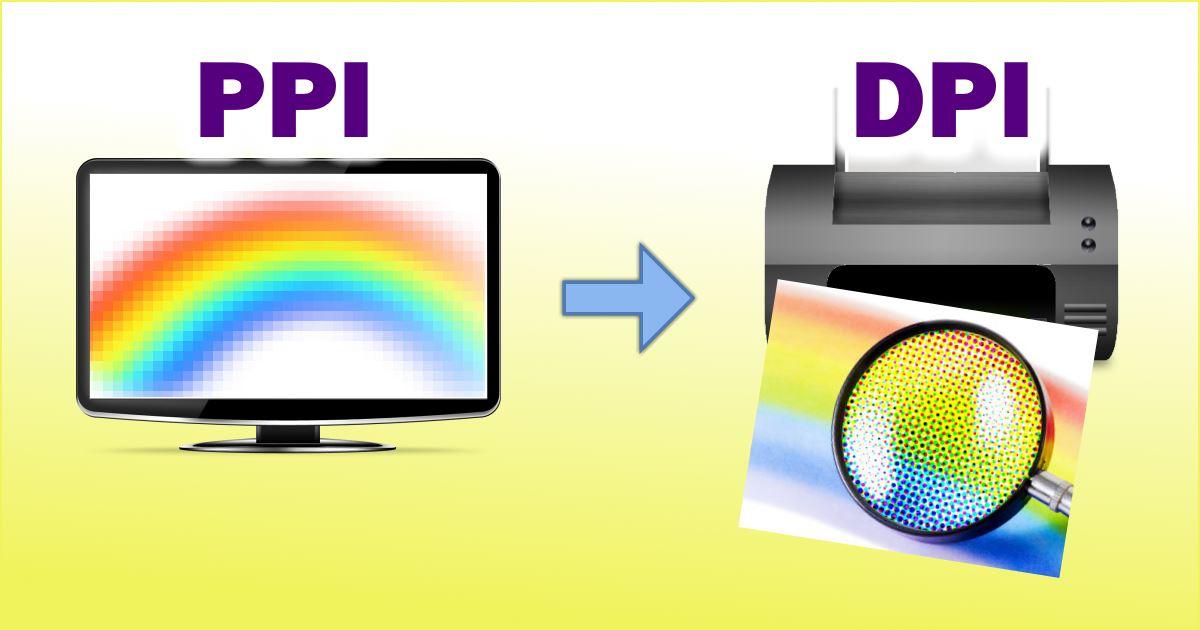
![Golf Open Championship Prize Money For Top Winners [Updated]](https://images.hitpaw.com/topics/top-trending-tips/golf-open-championship-prize-money.jpg)


Share this article:
Select the product rating:
Daniel Walker
Editor-in-Chief
This post was written by Editor Daniel Walker whose passion lies in bridging the gap between cutting-edge technology and everyday creativity. The content he created inspires the audience to embrace digital tools confidently.
View all ArticlesLeave a Comment
Create your review for HitPaw articles